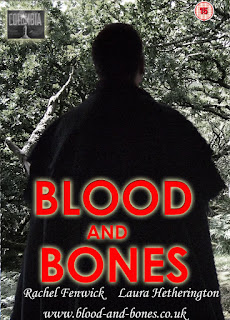Friday, 29 October 2010
Thursday, 7 October 2010
Teaser trailer for the Coen Brothers' True Grit
Watch and learn: note how there's movement in virtually every shot to build pace and engender a sense of excitement; nite how the edits are used to puncuate the piece and the style adds to the sense of the story unfolding before you...
Wednesday, 6 October 2010
Mise-en-scène
Mise-en-scène refers to everything within the frame of the screen. Some theorists and critics make a point of including diegetic sound (i.e. the sound that comes from within the scene, not sound coming from an external source). Otherwise, the key areas under consideration are the following:
• Production Design, such as sets, props and costumes - this includes colour!
• Lighting and shadow - also includes the use of colour!
• Actors’ performance (including make up), movement, gesture and position (blocking)
• Framing - including position; depth of field; aspect ratio; height and angle (but not movement)
The intepretation of the mise-en-scène will depend on the broader context of the film itself, but its construction can support the narrative and help raise (or play with) audience expectations and contextualise the camera shots, movement, editing and dialogue.
Here are several great shots from three movies; even if you don't know the storyline, you can certainly make an attempt to 'read' them based on the mise-en-scène. Click on the images to blow them up to A4-size.
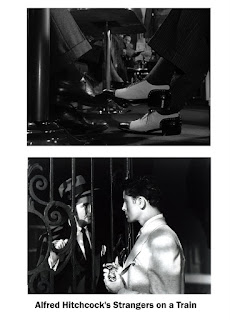
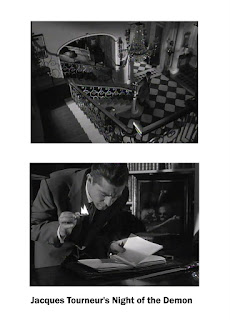
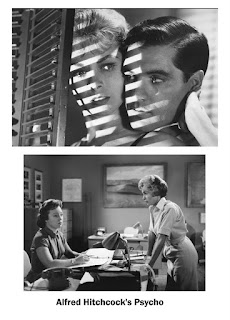
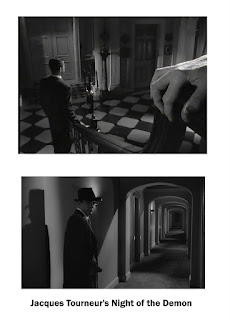
• Production Design, such as sets, props and costumes - this includes colour!
• Lighting and shadow - also includes the use of colour!
• Actors’ performance (including make up), movement, gesture and position (blocking)
• Framing - including position; depth of field; aspect ratio; height and angle (but not movement)
The intepretation of the mise-en-scène will depend on the broader context of the film itself, but its construction can support the narrative and help raise (or play with) audience expectations and contextualise the camera shots, movement, editing and dialogue.
Here are several great shots from three movies; even if you don't know the storyline, you can certainly make an attempt to 'read' them based on the mise-en-scène. Click on the images to blow them up to A4-size.




Monday, 4 October 2010
AQA GCSE Media Studies 2009-2011
Assignment 1
1/ A written analysis of a short extract from a TV programme (such as CSI, 24 or Spooks), paying attention to the key concepts: audience, media language, representation, audience and, where possible, institutional concerns
2/ Storyboard an opening sequence of a similar show
3/ Analyse effectiveness of own storyboards with reference to the key concepts
Assignment 2
1/ Analyse and compare two methods of promoting a film (i.e. trailer, website, poster, radio ad)
2/ On Photoshop, design a poster for a film of your own – and evaluate its effectiveness
3/ Storyboard a trailer and analyse its effectiveness
Assignment 3
Practical Production
Task: Produce at least four pages of a magazine, including a double-paged spread.
Students must provide evidence of knowledge of conventions of existing products by analysing magazine pages and flat plans; they also need to show awareness of the needs of audience by producing a survey or questionnaire and analysing the results.
The production must be accompanied by a written evaluation which relates the process of construction to the key concepts.
1/ A written analysis of a short extract from a TV programme (such as CSI, 24 or Spooks), paying attention to the key concepts: audience, media language, representation, audience and, where possible, institutional concerns
2/ Storyboard an opening sequence of a similar show
3/ Analyse effectiveness of own storyboards with reference to the key concepts
Assignment 2
1/ Analyse and compare two methods of promoting a film (i.e. trailer, website, poster, radio ad)
2/ On Photoshop, design a poster for a film of your own – and evaluate its effectiveness
3/ Storyboard a trailer and analyse its effectiveness
Assignment 3
Practical Production
Task: Produce at least four pages of a magazine, including a double-paged spread.
Students must provide evidence of knowledge of conventions of existing products by analysing magazine pages and flat plans; they also need to show awareness of the needs of audience by producing a survey or questionnaire and analysing the results.
The production must be accompanied by a written evaluation which relates the process of construction to the key concepts.
Subscribe to:
Comments (Atom)


